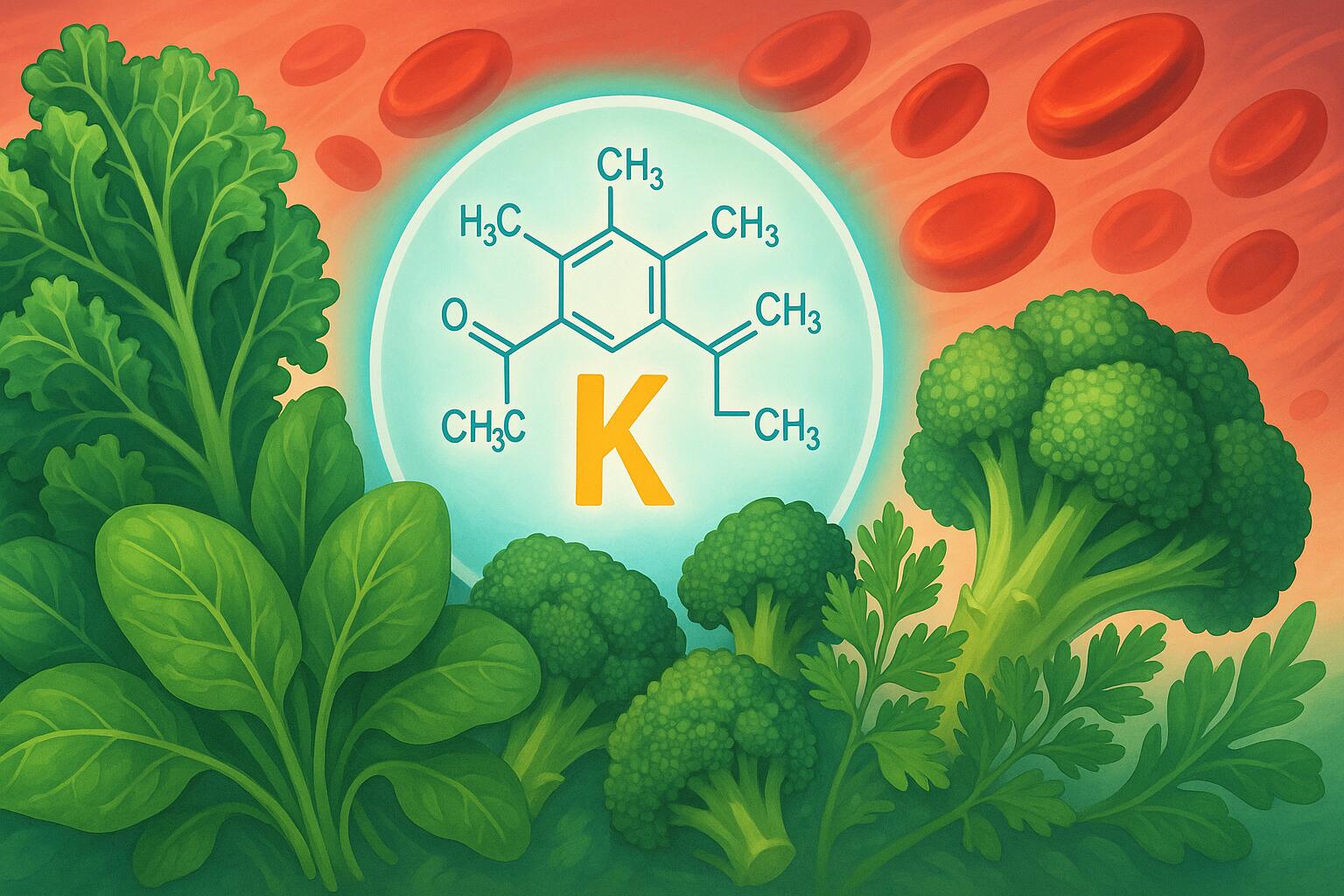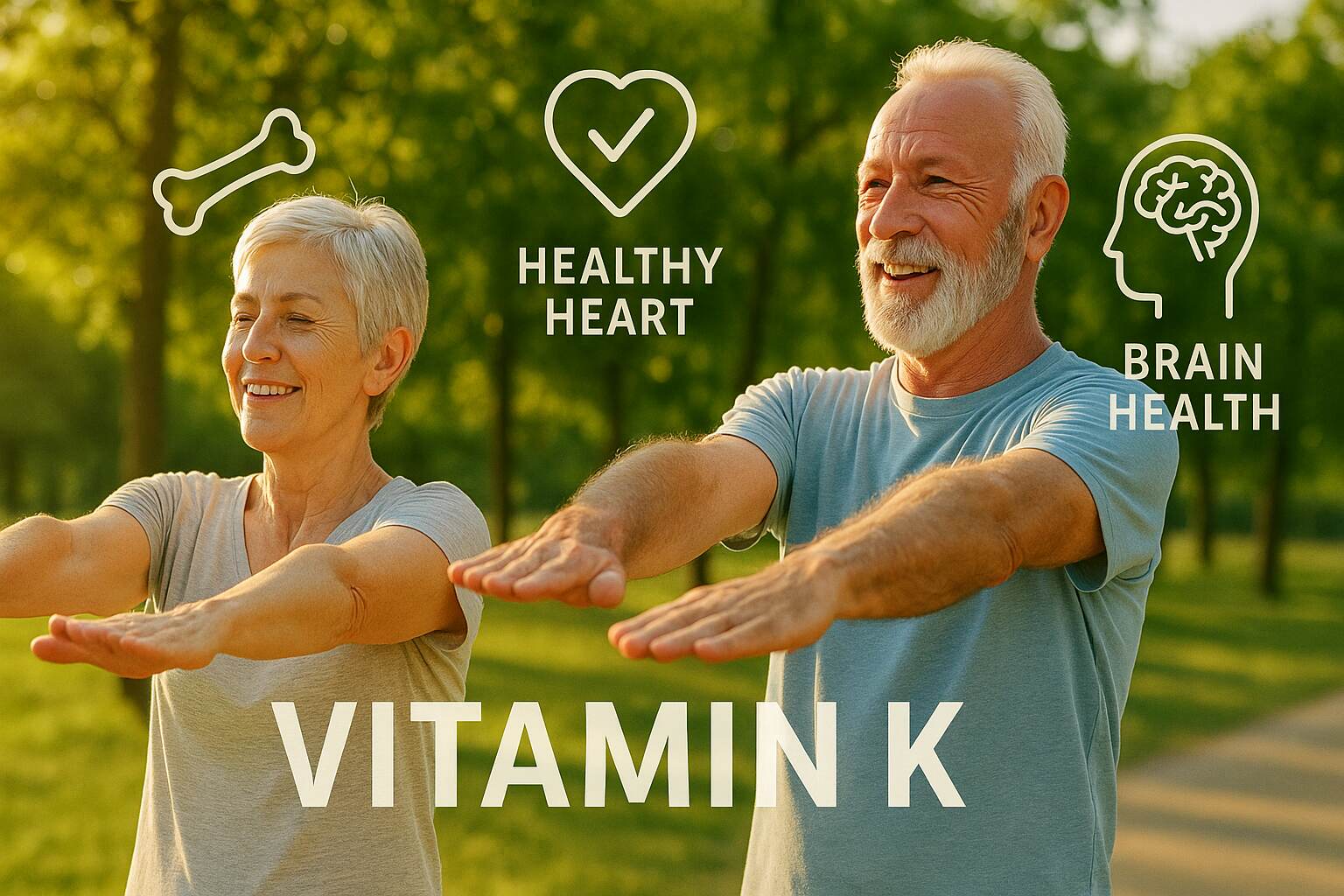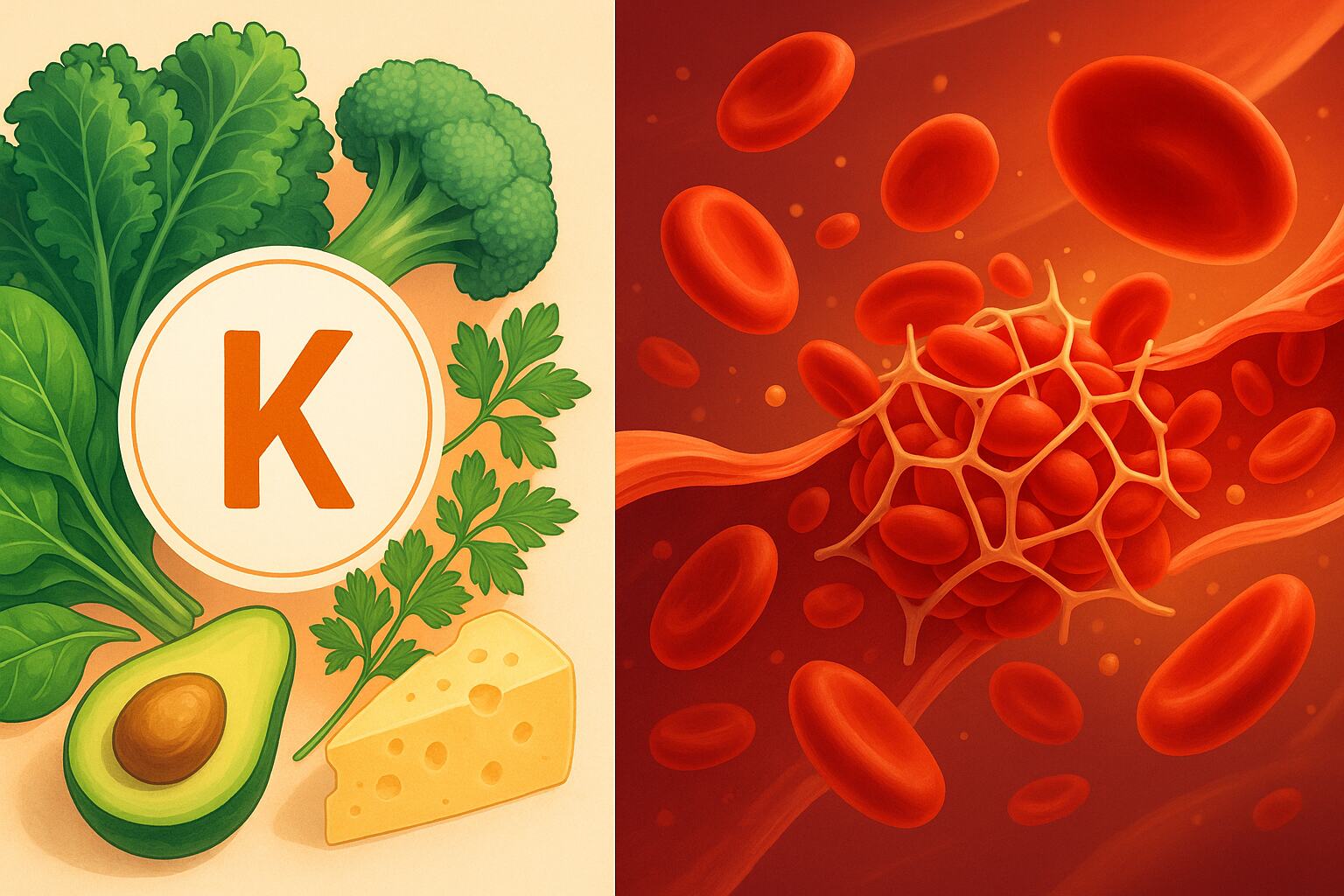When you get a cut or scrape, your body immediately springs into action to stop the bleeding. This remarkable process, called blood clotting or coagulation, depends heavily on one critical nutrient: vitamin K. Understanding this essential vitamin can help you maintain optimal health and prevent potentially serious bleeding complications.

What is Vitamin K?
Vitamin K is a fat-soluble vitamin that plays multiple crucial roles in your body. It comes in two primary forms: vitamin K1 (phylloquinone), found mainly in leafy green vegetables, and vitamin K2 (menaquinone), obtained from animal products like meats, cheeses, eggs, and fermented foods.
Unlike water-soluble vitamins that leave your body quickly, vitamin K is stored in the liver and other body tissues, including the brain, heart, pancreas, and bone. This storage capability means you don’t need to consume it every single day, though regular intake is important for maintaining adequate levels.

How Vitamin K Enables Blood Clotting
The relationship between vitamin K and blood clotting is both complex and fascinating. Vitamin K acts as a cofactor for a group of proteins known as the vitamin K-dependent clotting factors (II, VII, IX, and X), which are involved in the activation of blood-clotting proteins.
Here’s what happens at the molecular level: The primary function of vitamin K is adding carboxylic acid groups to glutamate residues to form gamma-carboxyglutamate residues during the creation of clotting factors. This process, called carboxylation, allows clotting factors to bind calcium ions—a crucial step that enables them to attach to blood vessel walls and form clots when needed.
Without sufficient vitamin K, your body produces clotting factors that lack these essential modifications. Without Gla on the amino termini of these factors, they no longer bind stably to the blood vessel endothelium and cannot activate clotting to allow formation of a clot during tissue injury.
To put it simply: vitamin K transforms inactive clotting proteins into active ones that can stop bleeding. Without vitamin K, our bodies would be unable to control clot formation.

Beyond Blood Clotting: Additional Health Benefits
While blood clotting is vitamin K’s most well-known function, research has revealed several other important benefits:
Bone Health
Vitamin K is involved with the production of proteins in bone, including osteocalcin, which is needed to prevent the weakening of bones. Studies have shown promising connections between vitamin K intake and bone strength. Research from the Nurses’ Health Study found that women who get at least 110 mcg of vitamin K a day are 30% less likely to break a hip than women who get less than that.
Heart Health
Your cardiovascular system also benefits from adequate vitamin K. The vitamin helps prevent the buildup of calcium deposits in arteries, which can lead to hardening and increased heart disease risk. This protective effect occurs through vitamin K’s role in activating proteins that regulate calcium placement in the body.
Cognitive Function
Emerging research suggests that maintaining proper vitamin K levels may support brain health, particularly in older adults. Higher blood levels of the vitamin have been associated with improved episodic memory—the type of memory that involves recalling past experiences with their associated context, emotions, and details.

How Much Vitamin K Do You Need?
Adults need approximately 1 microgram a day of vitamin K for each kilogram of their body weight. For example, if you weigh 65 kilograms (about 143 pounds), you’d need approximately 65 micrograms daily.
The recommended daily intake varies by age and gender:
- Adult men: 120 micrograms
- Adult women: 90 micrograms
- Children and adolescents: 30-75 micrograms (depending on age)
Best Food Sources of Vitamin K
Getting vitamin K through your diet is straightforward if you know which foods to eat. Vitamin K is found in green leafy vegetables, such as kale, spinach, turnip greens, collards, Swiss chard, mustard greens, parsley, romaine, and green leaf lettuce, as well as vegetables such as Brussels sprouts, broccoli, cauliflower.
Other excellent sources include:
- Vegetable oils (soybean, canola, and olive oil)
- Natto (fermented soybeans, exceptionally rich in vitamin K2)
- Meat and liver
- Eggs and dairy products
- Certain fruits like blueberries and kiwi
Because vitamin K is fat-soluble, foods high in unsaturated fats are healthy choices to eat just before vitamin K-rich foods. Try drizzling olive oil on your salad or adding avocado to maximize absorption.
Vitamin K Deficiency: Risks and Symptoms
Vitamin K deficiency in adults is rare, but may occur in people taking medications that block vitamin K metabolism such as antibiotics, or in those with conditions that cause malabsorption of food and nutrients. The most common causes include:
- Inadequate dietary intake
- Liver disease affecting vitamin storage
- Malabsorption conditions (cystic fibrosis, celiac disease)
- Long-term antibiotic use
- Medications that interfere with vitamin K (particularly blood thinners like warfarin)
Symptoms of deficiency include:
- Easy bruising
- Excessive bleeding from minor cuts
- Nosebleeds or bleeding gums
- Blood in urine or stool
- Heavy menstrual periods
- Prolonged clotting time
Special Concern: Newborns and Vitamin K
A deficiency is possible in newborn infants because vitamin K does not cross the placenta, and breast milk contains a low amount. This is why hospitals routinely administer vitamin K injections to newborns shortly after birth to prevent vitamin K deficiency bleeding (VKDB), a potentially life-threatening condition.
Important Considerations
Vitamin K and Blood Thinners
If you take anticoagulant medications like warfarin, maintaining consistent vitamin K intake is crucial. Warfarin functions by inhibiting an enzyme that is responsible for recycling vitamin K to a functional state. Sudden increases or decreases in vitamin K consumption can interfere with the medication’s effectiveness. Always consult your healthcare provider about dietary vitamin K if you’re on blood thinners.
Safety of Vitamin K Supplements
According to research, excess vitamin K intake cannot result in more clotting factor carboxylation, meaning high intake doesn’t increase thrombosis risk in healthy individuals. Taking 1mg or less of vitamin K supplements a day is unlikely to cause any harm. However, most people can meet their needs through diet alone.
The Bottom Line
Vitamin K is an essential nutrient that does far more than help your blood clot—though that function alone makes it indispensable. From supporting strong bones to protecting your heart and potentially boosting cognitive health, this often-overlooked vitamin deserves a place in your nutritional awareness.
The good news? You should be able to get all the vitamin K you need by eating a varied and balanced diet. Simply including leafy greens and a variety of vegetables in your daily meals will typically provide adequate amounts. If you have concerns about your vitamin K status or take medications that affect vitamin K, consult with your healthcare provider for personalized guidance.
Sources:
- National Institutes of Health Office of Dietary Supplements
- StatPearls (NCBI Bookshelf)
- Harvard T.H. Chan School of Public Health – The Nutrition Source
- Osmosis Medical Education
- NHS (National Health Service, UK)
- Cleveland Clinic
- Various peer-reviewed medical journals


